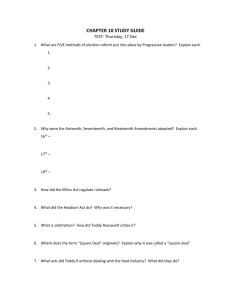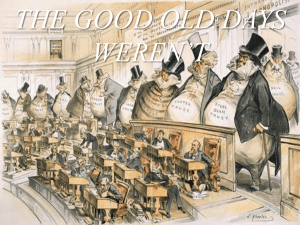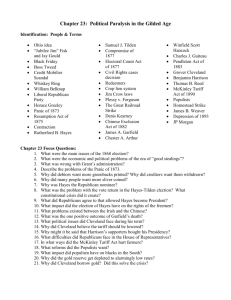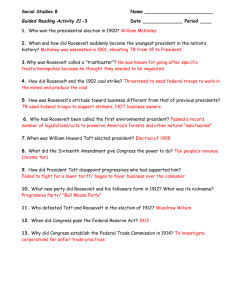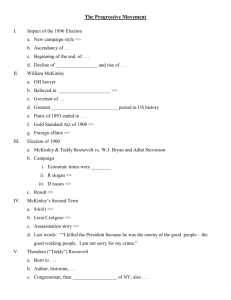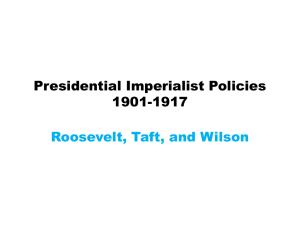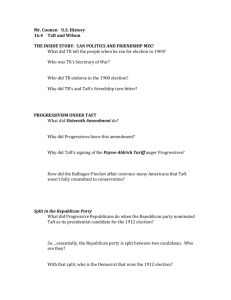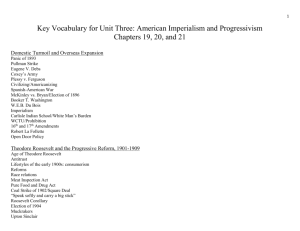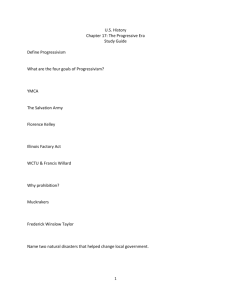A Walk Through Modern US History
advertisement
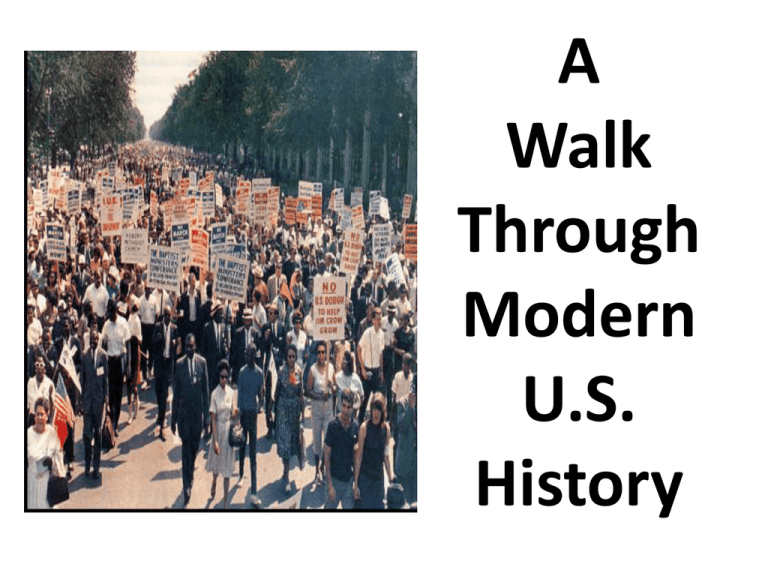
A Walk Through Modern U.S. History Rutherford B. Hayes 1877 – 1881 Republican from: Ohio Gilded Age President Compromise of 1877 1. Election of 1876 between Samuel Tilden and Rutherford B. Hayes filled with corruption – both sides claim victory. 2. Compromise of 1877 gives Hayes the election in return for removing federal troops from the south. 3. Compromise of 1877 ends Reconstruction and removal of troops paves the way for segregation – leads to Exoduster migration – freed slaves moving west for land. Western Frontier 1. Native Americans protesting U.S. policy of assimilation – making them like us – Chief Joseph of the Nez Perce is the most outspoken critic. 2. The Ghost Dance causes the U.S. army to become more aggressive in forcing the Native Americans onto reservations. Politics 1. Patronage – Also known as the spoils system, political officials reward their supports with government jobs – leads to corruption. 2. Political machines (like Boss Tweed and Tammany Hall in New York) keep their power by aiding the poor/immigrants in exchange for support. Economy 1. The economy operates under the principle of laissez – faire (hands off), so there is no government regulation of business. 2. Bland-Allison Act – Bimetalism – gold and silver used as currency in the U.S. 3. Thomas Edison invents the light bulb, allowing factories to work around the clock. Labor 1. Factory workers work long hours for low wages in terrible conditions. 2. Leads to the rise of labor unions. 3. Railroad Strike of 1877 – 2/3’s of the nations railroads were idle. Hayes called in troops to stop the strike – 100 were killed. 4. Munn vs. Illinois says states have the right to regulate railroad rates. 5. Knights of Labor, led by Terence Powderly, becomes the first large labor union – accepts anyone. James Garfield 1881 - 1881 Republican from: Ohio Gilded Age President Election of 1880 1. Republican Party splits: Stalwarts – Chester Arthur – favor the spoils system Half-Breeds – James Garfield – support civil service reform 2. Garfield wins nomination (and election) with Arthur as his running mate. Western Frontier 1. Helen Hunt Jackson writes A Century of Dishonor, describing the treatment of the Native Americans. 2. She’s part of the Social Gospel movement – push to apply Christian principles to social problems. Politics 1. The big issue is civil service reform. 2. The spoils system has led to corruption in government, especially under the influence of big businesses. Economy 1. Corporations, trusts and monopolies have developed. 2. Laissez – faire practices and Social Darwinism have combined to create a large gap between the factory owners and labor. 3. The Salvation Army, another aspect of the Social Gospel movement, develops to help the lower classes. 1. Garfield will be assassinated by Charles Guiteau at a Washington D.C. train station. 2. Guiteau was upset that he didn’t get a job in the government. 3. His death led to the passage of the Pendleton Civil Service Act. 4. The bullet didn’t kill Garfield, his doctors did. Garfield’s Assassination Chester Arthur 1881 – 1885 Republican from: New York Gilded Age President Pendleton Civil Service Act 1. The Pendleton Civil Service Act applicants for government jobs to take an exam to prove they were qualified for the position. 2. This law created much more accountability in government (at the federal level – state and local levels still dealing with the spoils system and corruption). Western Frontier 1. Live on the Great Plains difficult but new inventions like barbed wire and improved plows are making it easier. 2. Transcontinental railroad completed – Chinese laborers no longer necessary so the Chinese Exclusion Act prohibits the immigration of Chinese (now seen as competition for jobs). Politics 1. Nativism developing – don’t like the new immigrants coming from Eastern and Southern Europe. 2. They don’t assimilate into “American” culture. 3. Tenements developing to house the influx of immigrants – overcrowded, unsanitary and full of crime. Economy 1. Standard Oil formed by John D. Rockefeller – develops a monopoly on the oil trade using horizontal integration. 2. Robber Baron v. Captain of Industry debate develops. 3. Carnegie’s Gospel of Wealth says what they are doing is good but they have a responsibility to give back. Social Changes 1. Booker T. Washington starts the Tuskegee Institute. 2. The Brooklyn Bridge is completed – Bessemer process for making steel will lead to skyscrapers eventually. 3. Time zones established to make train schedules run smoother. Grover Cleveland (#1) 1885 – 1889 Democrat from: New Jersey Gilded Age President Election of 1884 1. The Republicans nominated James Blaine and the Democrats nominated Cleveland. 2. The election is a mud-slinging contest. Blaine’s corrupt and Cleveland had a premarital affair and a bastard child. 3. Charges of corruption (Mulligan Letters) lead to Blaine losing the election. Western Frontier 1. Railroad has a detrimental effect on the Native Americans – it brings more settlers west and it also brings the buffalo hunters. 2. The wide-spread slaughter of the buffalo does more to force the Native Americans onto the reservations than the U.S. army does. 3. 1886, Geronimo arrested – last of the major fighting between the Native Americans and the U.S. army. 4. In 1887 the Dawes-Severalty Act was passed – it broke up the reservations in order to get more land for settlers – Native Americans were encouraged to assimilate into U.S. society. Politics 1. The case Wabash vs. Illinois reversed the Munn vs. Illinois case, ruling that state’s couldn’t regulate railroads because it interfered with interstate commerce. 2. In response, the Interstate Commerce Act was passed to regulate railroads – not very effective because no real enforcement power. Labor 1. Haymarket Square Riot occurs – strikers blamed for the violence and the Knights of Labor go on the decline. 2. Samuel Gompers forms the American Federation of Labor – only allowed skilled workers in – no women or minorities. Strikes still the main weapon of the union. 1. The Flatiron Building is built in New York City. 2. The countries first “skyscraper”, it will lead to cities growing up instead of out – along with the invention of the elevator. 3. The Statue of Liberty goes up in New York Harbor (Staten Island). Social Changes Benjamin Harrison 1889 – 1893 Republican from: Indiana Gilded Age President Election of 1888 1. The Republicans nominate Benjamin Harrison to run against Grover Cleveland. 2. Cleveland won the popular votes by 100,000 but lost the electoral votes by 36. 3. Harrison promised a strong, protective tariff as part of his campaign. Fredrick Jackson Turner 1. In his thesis, Frederick Jackson Turner is going to claim that the American frontier is gone. 2. The Oklahoma Territory will be set aside for the Native Americans. 3. The Battle of Wounded Knee marks the last fighting between the Native Americans and the U.S. army. Politics 1. The Populist Party forms to fight for the rights of the American farmer – income tax, direction election of Senators, coining silver and controlling the railroads. 2. The Sherman Antitrust Act is passed in an attempt to regulate monopolies. 3. The Sherman Silver Purchase Act is passed – requires the government to buy silver and redeem currency in gold or silver. 4. The McKinley Tariff is passed – the highest tariff in American history. Economy 1. The McKinley Tariff is going to create a huge surplus that Harrison is going to use for many internal improvements around the country – the Billion Dollar Congress. Labor 1. The Homestead Strike occurs in 1892. 2. Company town where workers live in deplorable conditions – go on strike to demand better pay and living conditions. 3. Pinkerton detectives come in to bust up the strike and ten people are killed. 4. In the end, the union survives but the working conditions remain. Social 1. Jane Addams opens the Hull House. 2. The Hull House is a settlement house. 3. Its purpose is to aid immigrant women and children in the crowded tenements. 4. Provided a place to live, day care, job training and educational services. Grover Cleveland (#2) 1893 – 1897 Democrat from: New Jersey Gilded Age President Election of 1892 1. The Democrats nominate Grover Cleveland to run against Harrison again. 2. The Populist Party nominates James Weaver. 3. Cleveland wins, becoming the only president to serve two non-consecutive terms. Frontier Remember, there is no frontier any more. However, farmers living in the west are struggling due to the high tariffs, unfair practices of the railroads, corporate greed and general and by the fact that the Sherman Silver Purchase Act is about to be repealed and we are going to go onto the Gold Standard, making currency even more scarce in the west. This will lead to the growth of the Populist Party. Politics 1. The Sherman Silver Purchase Act is repealed in response to the Panic of 1893. Economy 1. The Panic of 1893 was the worst economic depression the country had faced at that time. 2. Cleveland did little to address the situation because he believed the economy would fix itself. 3. Coxey’s Army was a group of unemployed workers who marched on Washington D.C. – want the government to create jobs using tax dollars – they were eventually arrested for trespassing on the Capital grounds – maybe led to the Wizard of Oz. Labor 1. Eugene V. Debs become president of the American Railway Union. 2. In 1894 the workers at the Pullman factory go on strike over wagers and high rents. 3. Cleveland eventually sends in troops to stop the strike because its interfering with the delivery of the mail. 4. Debs was arrested and jailed. Social 1. Plessy vs. Ferguson opens the door for legalized segregation in the south. 2. Booker T. Washington gives the Atlanta Compromise speech – draws criticism from northern African Americans. 3. Hurst and Pulitzer are competing to attract customers with yellow journalism. 4. Williams Jennings Bryan gives his Cross of Gold speech and begins preparing for his stay in the White House (not). William McKinley 1897 - 1901 Republican from: Ohio Progressive President Election of 1896 1. The Republicans run William McKinley against Williams Jennings Bryan and the Democrats (try #1). 2. The big issues were the tariff and the gold standard. 3. McKinley won easily. Frontier/Imperialism 1. There is no frontier, so some are pushing for the U.S. to expand her borders for both trading and military purposes. 2. We will get into the Spanish-American War and be involved in the Boxer Rebellion during this time – part of our Open Door Policy to keep China open for trade. Politics 1. The Gold Standard Act will be passed, requiring all U.S. currency to be backed by gold. 2. The Teller Amendment said that the U.S. wouldn’t take over Cuba. 3. We annexed Haiwaii. Social 1. The first grandfather clause is enacted in Louisiana. That combined with the poll tax and literacy test effectively allowed poor, uneducated whites to vote while keeping African Americans from voting. Spanish-American War Causes: 1. Atrocities committed by the Spanish against the Cubans. 2. DeLome Letter – Spanish diplomat accused McKinley of pushing for war – leaked to the press. 3. Yellow journalism. 4. Sinking of the U.S.S. Maine in Havana Harbor – blamed on the Spanish but probably came from within the ship. Spanish-American War Effects: 1. Teddy Roosevelt becomes famous with his Rough Riders squadron. 2. We get the Philippines, Guam and Puerto Rico - later put down a rebellion in the Philippines. 3. War ended with the Treaty of Paris. Election of 1900 1. The Republicans run McKinley with Teddy Roosevelt (his first vice president died in office) against Williams Jennings Bryan and the Democrats (try #2). 2. The big issue was imperialism – isolationists are opposed to the U.S. operating in other areas of the world. McKinley Assassination 1. McKinley was assassinated in a receiving line in Buffalo, N.Y. 2. He was shot by Leon Czolgosz, an anarchist. 3. His vice president Teddy Roosevelt became president. Theodore Roosevelt 1901 - 1909 Republican from: New York Progressive President The Square Deal 1. Roosevelt’s social platform was called the Square Deal. 2. It involved the Three C’s: 1. Control of corporations (not all were bad though) 2. Consumer protection 3. Conservation of natural resources Controlling Corporations 1. The Coal Strike of 1902 occurred in Pennsylvania and Roosevelt brought both sides to the White House and threatened the owners to agree to arbitration. 2. The Elkins Act strengthened the Interstate Commerce Act – gave it enforcement powers. 3. The Department of Commerce and Labor was created to look into business operations. They used the courts to bust up “bad” monopolies. 4. The Hepburn Act strengthened the Interstate Commerce Act - allowed the government to regulate railroad rates. Consumer Protection 1. The Pure Food and Drug Act and the Meat Inspection Act were passed to protect the public from impure products. Conservation of Natural Resources 1. The Newlands-Reclamation Act allowed the government to collect money from the sale of public lands and use it to improve other government lands. 2. The National Conservation Commission compiled an inventory of U.S. natural resources for the purpose of resource management. Imperialism 1. Roosevelt introduced the Roosevelt Corollary to the Monroe Doctrine. 2. The “Big Stick Policy” said that the U.S. would protect the entire Western Hemisphere, especially the Caribbean (and our business interests there) – also called gunboat diplomacy. 3. The Platt Amendment said that Cuba couldn’t make a treaty with another nation with out U.S. approval. 4. He encouraged a rebellion in Panama (against Columbia) so he could build the Panama Canal. 5. He sent his “Great White Fleet” around the world to show off the might of the U.S. Navy. 6. He continued to support the Open Door Policy in China. 7. He received a Nobel Peace Prize for using arbitration to get a peace treaty in the Russo/Japanese War. Labor 1. The Industrial Workers of the World Union or the Wobblies was created in 1905. 2. This union was made up of socialists, anarchists and radical unionists from all over the U.S. 3. Their goal was to promote worker solidarity in the revolutionary struggle to overthrow the employing class. 4. This organization helped fuel the U.S. public’s later association of labor with communism. Social 1. Muckrakers like Ida Tarbell, Upton Sinclair and Lincoln Steffens were using their literary abilities to draw attention to the ills of U.S. society. 2. The San Francisco Earthquake occurred. 3. The Ford Motor Company was established. 4. U.S. Steel was formed (J.P. Morgan). William Taft 1909 - 1913 Republican from: Ohio Progressive President Election of 1908 1. Teddy Roosevelt handpicked Taft to succeed him, believing he would carry on with his policies – the Democrats ran William Jennings Bryan again (try #3). 2. Eugene V. Debs ran as a socialist. 3. Taft won easily. Politics 1. The Supreme Court decided Muller vs. Oregon, which allowed a state to regulate how long women worked. 2. The Payne-Aldrich Tariff was passed, putting very high tariffs on important imports (Taft didn’t like but didn’t stop it – the issue split the Republican Party). 3. The Dawes Act opened up more tribal lands for U.S. settlers. 4. The Mann-Elkins Act reinforced the powers of the Interstate Commerce Commission. 5. The case Standard Oil vs. U.S. found Standard Oil guilty of monopolizing the petroleum industry and it was forced to break up into competing firms. Imperialism 1. Taft instituted dollar diplomacy in regard to Latin America, using economic influences instead of military force to promote American business interests abroad. The Ballinger-Pinchot Controversy The Secretary of the Interior Richard Ballinger opened up some federal lands to development. Gifford Pinchot (the head of the U.S. Forestry Service) claimed he was putting private business over conservation. Taft sided with Ballinger – he supported conservation but not as much as Roosevelt did. This made Teddy mad! Social 1. WEB Dubois forms the National Association for the Advancement of Colored People (NAACP). 2. Henry Ford develops the assembly line method and introduced the Model T – inexpensive cars that will increase the number of U.S. citizens with vehicles – the assembly line method will also be copied by other industries. Woodrow Wilson 1913 - 1921 Democrat from: New Jersey Progressive President Election of 1912 1. Teddy Roosevelt was upset with Taft so he decided to run again in 1912: 1. The Republicans nominate Taft. 2. The Democrats nominate Woodrow Wilson. 3. Teddy Roosevelt runs for the Progressive Party/Bull Moose Party. 4. Teddy splits the Republican vote, allowing Wilson to win. Progressive Amendments 1. 2. 3. 4. 16th – Graduated income tax 17th – direct election of Senators 18th – Prohibition 19th – suffrage for women Politics 1. The Underwood Tariff reduced the PayneAldrich Tariff. 2. The Federal Reserve Act created the Federal Reserve Board, which managed the Federal Reserve Banks, which were used to keep some of the money of private banks. 3. The Clayton Antitrust Act put more limits on monopolies to protect small businesses. 4. The Federal Trade Commission was created to investigate the business practices of corporations. Social 1. The Panama Canal was completed. 2. The film Birth of a Nation was released, which was about the rise of the Ku Klux Klan. 3. Margaret Sanger began advocating the use of birth control. World War I Begins 1. Begins with the assassination of Arch Duke Franz Ferdinand in Serbia. The underlying causes were: 1. 2. 3. 4. Nationalism in Europe. Militarism in Europe. Imperialism in Europe. Secret alliances in Europe. Wilson and the War 1. Most people in the U.S. were isolationists who believed World War I was a European affair and that the U.S. should not get involved. 2. Woodrow Wilson was reelected in 1916 with the slogan “He Kept us out of War”. The U.S. Enters WWI Causes: 1. The sinking of the Lusitania. 2. The Sussex Pledge after the French passenger ferry the Sussex was sunk. 3. The Zimmerman Telegram. 4. The unrestricted submarine (u boats) warfare against U.S. merchant ships. In the U.S. During WWI 1. The Selective Service Act was passed to draft soldiers into the military. 2. The War Industries Board was created to encourage factories to use mass production techniques to make war materials. 3. The Espionage Act and Sedition Act are passed to prevent spying and anti-war protests. 4. The Palmer Raids were used against suspected radicals and “hyphenated” Americans and the court case Schnenck vs. U.S. said leaflets opposing the draft weren’t protected under the 1st Amendment. 5. The Great Migration occurred, which large number of African Americans leaving the south to find jobs in the north and to escape the segregation of the south – led to race riots in northern cities. 6. Daylight Savings Time is started to conserve fuel. 7. First radio broadcast occurred in Pittsburg. U.S. Enters WWI 1. The U.S. entered the war – Wilson sees it as a chance to spread democracy – missionary diplomacy. 2. The Bolshevik Revolution happens in Russia – the communist take over and withdraw Russia from WWI. 3. When we win, Wilson makes his Fourteen Points address, outlining his plans for peace after the war – the main item being the League of Nations. 4. The Treaty of Versailles ends the war – Germany takes all the blame and has to pay reparations and loses territory – we refuse to ratify the treaty because of U.S. Senators (led by Henry Cabot Lodge) don’t want to be in the League of Nations. Warren Harding 1921 - 1923 Republican from: Ohio Return to Normalcy/Isolationism Election of 1920 1. The Republicans nominate Warren G. Harding and Calvin Coolidge. 2. The Democrats nominate James M. Cox and FDR. 3. Harding wins by promising a “return to normalcy” and future isolationism. Politics 1. The Washington Disarmament Conference was held to discuss limiting arms. Other agreements were made to respect other people’s holdings and to keep the Open Door Policy going in China. 2. The Immigration Restriction Act/Emergency Quota Act were passed to limit the number of immigrants entering the U.S. 3. The Federal Highway Act was passed to build more roads for the growing number of cars in the U.S. 4. The Ford-McCumber Act put extremely high tariffs on foreign goods – led to huge decline in foreign trade. Red Scare 1. The first Red Scare occurs in the U.S. as Vladimir Lenin forms the Soviet Union. 2. Communism developing from the working class in the U.S. a real fear of the U.S. public. Scandals 1. Harding’s presidency was full of scandal. 2. The worst was the Teapot Dome Scandal. Death of Harding 1. Harding died of a heart attack in 1923, causing Calvin Coolidge to become president. 2. Coolidge’s first order of business was to clean up the scandals that occurred under Harding – fired many people. Calvin Coolidge 1923 - 1929 Republican from: Ohio Roaring 20’s Politics 1. The McNary-Haugen Bill provided for the government to buy surplus crops to sell them abroad (trying to help farmers – no real market for the goods though). 2. The Dawes Act of 1924 – U.S. treaty with Germany after World War I. 3. The National Origins Act – limited immigration based on where you were from. 4. The Kellog-Briand Pact – Group of 64 nations agreeing to settle dispute peacefully (no way to enforce it). 5. Laissez-faire business practices – headed towards the Great Depression. Social 1. Scopes Monkey Trial – creationism vs. evolution 2. Jazz Age – Great Gatsby, Charles Lindberg flight, Golden Age of Sports, Harlem Renaissance, the Lost Generation 3. Sacco and Vannzetti Trial – nativism 4. Prohibition effects: flappers, speakeasies, rise of organized crime 5. Influence of automobile in the U.S. – jobs, independence, architecture, growth/sprawl of cities Herbert Hoover 1929 - 1933 Republican from: California Great Depression Politics 1. The Agricultural Marketing Act – tried to help farmers use their own organizations to be more efficient 2. The Young Plan – program to try to help Germany meet the demands of their war debt 3. The Smoot-Hawley Tariff – toughest U.S. tariff ever – designed to protect U.S. industry – brings world trade to a standstill 4. The Reconstruction Finance Corporation – Hoover’s only effort to stop the Great Depression – gave money to the states to do what they wanted with – nothing for individuals – rugged individualism!!! Japan 1. Japan invaded Manchuria in 1931 – U.S. told Japan to back out or else but Japan ignores us – we do nothing 2. We make the Hoover-Stimpson Doctrine, saying we won’t recognize any changes to China’s territory or sovereignty Stock Market Crash 1. Black Tuesday – October 29, 1929 – stock prices plummet because of: 1. speculation – buying stocks and bonds for a quick profit 2. buying on margin – paying a small part of the stock’s price and borrowing the rest – pay back debt from profits when you sell Causes of the Great Depression 1. Tariff and war debt policies 2. U.S. overproduction of goods and low demand 3. Farm problems 4. Easy credit 5. Unequal distribution of wealth The Bonus Army 1. 15,000 World War I vets march on Washington wanting their bonus that was promised them in 1945. 2. Hoover tells them to go home and they refuse. 3. Hoover sends in troops to disperse them – led by Eisenhower and McArthur – guns go off, fire starts – Hoover looks really bad doing this to veterans Franklin D. Roosevelt 1933 - 1945 Democrat from: New York New Deal and World War II First 100 Days/New Deal 1. FDR used his fireside chats to reassure the U.S. public that everything would be okay. 2. Calls for a bank holiday – closes them down and then reopens only the strongest. 3. The New Deal programs have three goals: 1. Relief 2. Recovery 3. Reform New Deal Amendments 1. 20th – “lame duck” amendment – changes president’s inauguration date from March to January. 2. 21st – repeals the 18th – no more Prohibition – more money coming into the economy through taxes on alcohol World War II Begins 1. Congress passes the Neutrality Acts, keeping the U.S. out of the war. 2. FDR kept the U.S. neutral but he aided the Allies with the cash and carry and the lendlease policies. 3. He established the good neighbor policy with Latin America. Social 1. The Indian Reorganization Act is passed, allowing the tribes to govern themselves. 2. The Congress of Industrial Organizations is formed (new labor union). 3. The Dust Bowl is going on. December 7, 1941 1. Japan bombs Pearl Harbor and the U.S. enters World War II. 2. The Selective Service Act is passed and the War Production Board and the War Labor Board is formed. 3. U.S. citizens of Japanese heritage are imprisoned in the interment camps Korematsu v. U.S. says that’s okay.

